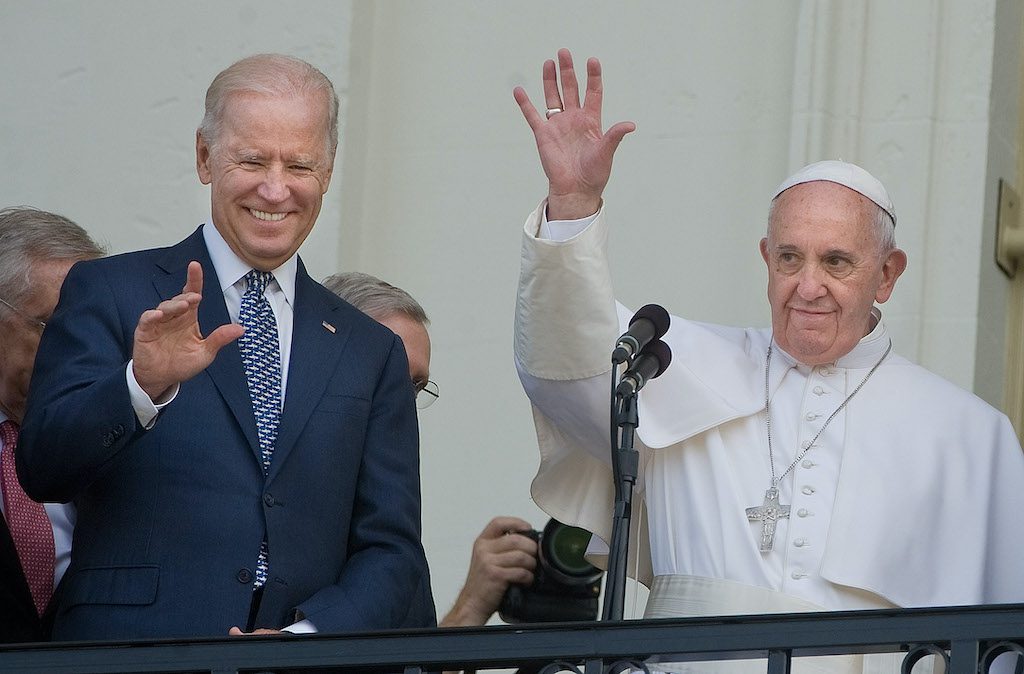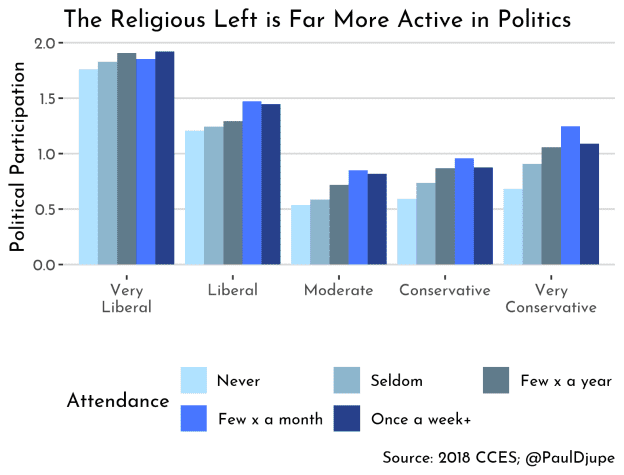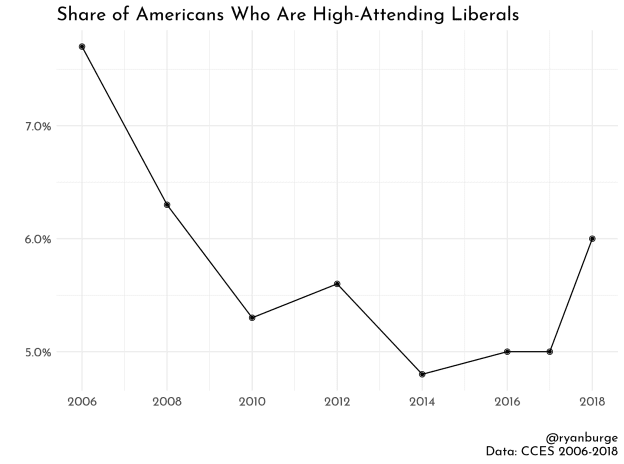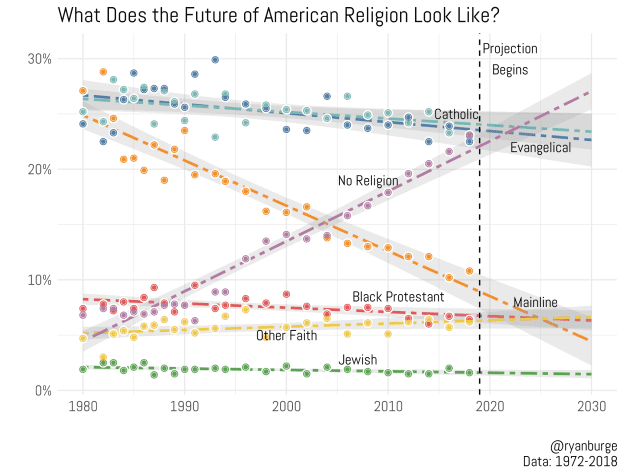The Coming Fake Liberal Religion Boom

Yesterday, Twitter was having a blast making fun of Rep. Emanuel Cleaver (D-Kansas) and his dopey woke prayer to open the new Congressional session. Cleaver, who is an ordained United Methodist minister, prayed to “the monotheistic god,” then invoked Brahma (one of the many Hindu gods) “and God known by many names by many different faiths,” then said “amen, and awomen.” I told a friend about this, and he accused me of making it up. Nope, it really happened:
Where do you even begin with this? Not all religions are monotheistic. How can a Christian believer — much less a Christian pastor! — pray in the name of a non-Christian god? Is Cleaver so ignorant of and disrespectful to non-Christian religions that he believes we’re all praying to the same deity, just under different names? Is he really so thick that he believes “amen” is a gendered English word (it’s a Hebrew word meaning “so let it be”)?
This prayer was an illustration of every conservative’s parody of woke religion. But again, it really happened.
Perhaps we will be expected to give Cleaver the benefit of the doubt, because he is a pastor in the black church. Jonathan Lee Walton, head of Wake Forest’s divinity school, says that attacks on Georgia Democratic Senate candidate Raphael Warnock, a Baptist pastor, misrepresent the black church. Excerpt:
The attacks misconstrue African American progressive and prophetic religious protest. Informed by the evangelical strand of the social gospel, this tradition places an overwhelming moral emphasis on society’s most vulnerable and oppressed. It demands that Christians bear witness and ameliorate the suffering of others, as set forth in the parable in Matthew 25 where Jesus likens our treatment of God with how we treat those without food and shelter, or those who are sick and imprisoned: “Truly I tell you,” Jesus says of those who enter God’s kingdom, “whatever you did for one of the least of these brothers and sisters of mine, you did for me.” Indeed, in his December debate with Loeffler, Warnock said: “I’m a Matthew 25 Christian.”
Well, unless one of the least of these is an unborn child. In that case, Rev. Warnock calls protecting the right to exterminate that child in the womb “reproductive justice” (earning the public rebuke of other black pastors in Georgia).
Be that as it may, far be it from any conservative Christian to fault a pastor involving himself in politics. In fact, I don’t think the criticism of Warnock is coming from people on the Right who believe religious folks should not be involved in politics. It’s criticism of his religious and political beliefs. And why not? If you are going to mix religion with politics, then you invite that criticism. It’s perfectly fair.
The hypocrisy here is not Warnock’s, but the media’s. Newspapers like the Washington Post, The New York Times, and other major outlets never lack for condemnation of “theocrats” on the Right, for allegedly using politics to impose their religious views on the nation. The Times just published a favorable profile of Warnock, the pastor-politician, because his church takes progressive political stands.
The aggravating part is the absence of principle here. When conservative religious folks involve themselves in politics, they are covered as a threat to the country. But when liberals religious folks — especially liberal black preachers — do it, gosh, ain’t that a glorious thing! And in The New Republic, a once-important voice on the Left, we are told that to criticize the political stances that this political candidate, Warnock, has taken means that you are a bigot who hates the black church and its positions. Well, what if someone genuinely disagrees with a theological stance taken by Warnock or others in a black church? Does the color of their skin mean they can’t be criticized on theological grounds?
The Guardian is thrilled that a liberal Catholic is about to become US President, and wonders if liberal Christians are about to have their moment. The answer is no, they’re not. Remember how when Pope Francis was elected, some progressive commentators, both Catholic and secular, prophesied that having a more liberal pope would bring young people to the Church. Didn’t happen. The purpose of liberal Christianity seems to be to baptize whatever political and cultural progressives want this week, however little it coheres with Biblical, historical Christianity. What is the point of liberal Christianity, as it exists in the US today? How many liberal Christians parents pass the faith on to their children? I didn’t say “want to pass the faith on to their children;” I mean succeed at it.
According to data presented by political scientists Paul Djupe and Ryan Burge, the Religious Left is only a very small part of the American Christian scene, but it draws far more attention than its size merits because it is by far the most politically involved of any US Christian demographic.

There are no guarantees that your kids will practice the faith in their adulthood, but if they don’t see their parents practicing the faith, they are far more likely not to practice it either in their adulthood. That’s why the steep decline in the number of self-identified progressives who attend church weekly bodes ill for the liberal church (though it did rise somewhat after Trump took over):

We always read things in the papers forecasting the rise of the Religious Left, but it’s mostly wishful thinking on the part of journalists. Djupe and Burge write:
The religious left does exist and it is growing. However, it still makes up a very small part of the American population. It’s fair to say that just one in twenty Americans could be classified as highly religiously involved and politically liberal – our definition of religious left. But, their voices are louder than their numbers as a function of how active they are in politics. In a future post, we’ll assess the issue agendas of the religious left, anticipating that it is highly fragmented given the religious and racial diversity within the group.
It’s important to put these numbers in perspective, though. While ~5% of people can be classified as the religious left, that’s just one third of the size of white evangelicals or one sixth the size of the religiously unaffiliated. That’s not to say that they can’t have an impact on politics, especially at the state and local level, but it’s fair to say that they cannot match the size and power amassed by the religious right.
For purposes of my post, the key words are “highly religiously involved.” In post-Christian America, if you are not highly religiously involved, the odds are long that your kids will be highly religiously involved as adults. Nobody wants to hear that, but it’s true. Here is Burge’s projection for what religious life in the US will look like over this next decade: collapse of the Mainline, stagnation and slight decline for everybody else, and skyrocketing numbers for the religiously unaffiliated.

What is much harder to predict is where religious belief will be farther out than a decade, as young people who may affiliate with church now stop attending. In the piece where he offered that graf, Burge said it can’t account for black swan events that affect churchgoing. Covid-19 has been just such an event. We’ve all heard doom-and-gloom predictions from pastors saying that once churchgoing is normal again, they fear many in their congregations won’t come back. These were the nominal believers who just came out of habit. I think this will add to the Nones category.
The thing about Nones is not that their beliefs aren’t sincere, but that they’re watery. They are not attached to a tradition, to a way of life, to institutions. Therefore, they can’t be passed down to the next generation. This is something most American Christians of all kinds don’t seem to understand: the faith has to be embodied. If it’s nothing but a series of abstract propositions requiring mental assent, it can’t stand. We’re all familiar with the person who says, “I don’t need to go to church to find God. I find him out here on the beach/with my horses/in my quiet time on my back porch/etc.” It is true that God is everywhere present … but this is beside the point. The purpose of going to church is not to have an individual experience of God (though one hopes for that).
We live in a culture that conditions us to privilege individualism, including individual emotional experiences. The “spiritual but not religious” mindset is perfect as an expression of the age. But it won’t last, because it can’t last. Neither can a religious mentality that substitutes political engagement for substantive religious belief and disciplined commitment. If you hear the voice of conservative Christian triumphalism in this blog post, then you are not listening to me clearly. A major theme of my work these past few years has been that all Christianity, not just liberal Christianity, is facing destruction, because it hasn’t found a way to defy the acid bath of liquid modernity, the font of which is Expressive Individualism. We conservatives will outlast the liberals, but without some sort of deep conversion to a countercultural way of life, it’s just a matter of time for us too.
Last year, I wrote about shocking new research findings showing that only a fraction of American Catholics both know what the Catholic Church teaches about the Eucharist, and believe it. It is hard to overstate to those outside the Catholic Church (and the Orthodox Church) how important this is. It represents a colossal failure on the part of the institutional church, and of parents, to pass a core element of the Catholic faith on to their kids. Catholicism is collapsing in Italy too, you I found social science research in Italy showing that only a small minority of Italians describe themselves as “active and practicing” their Catholic faith, and of that number, only 22 percent report having adult children who are following in their path.
Think about that: even the most devout and engaged Italian Catholics lose four out of five of their children to the faith. This, in a country where the cultural infrastructure of Catholicism is incomparably greater than the Christian (Catholic and non-Catholic) equivalent in the US.
And now we are swiftly moving into a situation here in America in which small-o orthodox Christians who cannot cooperate with progressive ideology (on LGBT, race, and/or abortion) are going to be de facto barred from certain professions. Middle-class conservative Christians do not want to hear this, because they are accustomed to thinking of the Christian faith as an adjunct to worldly success. Those days are over. If you don’t wake up now and start preparing yourself, your family, and others in your congregation for the world as it is, and as it soon will be, you will find your children having to choose between a career as a lawyer, physician, etc. — and their faith. It’s a hell of a choice to put onto a young person, especially a young person who has been given no firm basis on which to choose faith (when it brings suffering) over worldly success.
To return to the reason for this post: our secular media are going to find all kinds of reasons to praise progressive Christianity, and to demonize those Christians who reject it (“Racists!” is what they call Christians who criticize progressive black churchmen.) There is no future for progressive Christianity. There is also no future for conservative Christianity that construes itself as little more than MAGA at prayer. I’m a conservative Christian who would walk away from a church like that, not in spite of being conservative, but because of the things that mark me out as a traditionalist within Christianity. One thing to keep in mind, though, from Djupe and Burge’s research, is that self-identified liberal churches are far more political than self-identified conservative churches. It’s just that they don’t get a lot of press coverage because the secular liberal media neither fear nor loathe them.
No one can presume to know where a person truly stands with God. One can be publicly devout, but have a cold hellbound heart. One can be a hot mess religiously, but be mysteriously close to the Kingdom (see the phenomenon of “holy fools”). But we can know about people by their public statements and actions, and it’s fair to judge how well a person’s words and actions match what they profess to be true (this, as distinct from saying, “Ultimately, sir, you are going to heaven/hell”). It would be newsmaking if Joe Biden took a single political stand on behalf of his Catholic faith, that conflicted with liberal political goals. I don’t think he will, but we are going to be subjected to four years of, “See, even devout Catholic Joe Biden believes that you can support same-sex marriage, sex changes for children, and unlimited abortion, and still be a Catholic in good standing. Why can’t you say the same?”
Put another way, get ready for newspaper and TV profiles of the Religious Left, press attention that will vastly overstate their size and influence. As with the Religious Right, the media see what they want to see.
I wonder how many of Joe Biden’s descendants are regular massgoers. His son Beau is dead, and Hunter — well, it doesn’t appear that he darkens the door of the church too often. But what about the grandkids?
UPDATE: Forgot to say that for those who are interested in reading my daily newsletter, which focuses on religion, ideas, and culture, but without the polemical edge (and no politics!), it is now available for subscription only. Click here for more information. Tonight’s issue will focus on a new Dante online exhibition, among other things.